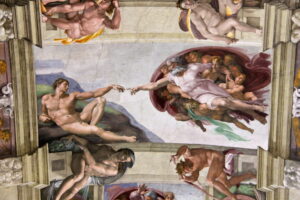Often, we struggle to see ourselves as sons and daughters of God.
In our heads, we feel like God is too big and too grand to be affiliated with us and the mundanity of our lives.
It’s easier to think of God as Creator, Lord, God of the Universe, Author of our lives.
But Father? Dad? It seems a little too close for comfort. Our vulnerability sensors go off. It can feel scary.
For many people, their relationship with their human father is imperfect, and this pain clouds their understanding of their divine Father.
There’s a lot here to unpack.
Keep reading, and you will discover the deep intimacy and close relationship God desires to share with you.
God’s Fatherhood
Many dismiss the image of God the Father as an old man with a beard. The Father is not a male human being, true. In reality, God the Father transcends male and female: he is pure spirit and therefore has no corporal body (see CCC 239).

But the image of God the Father by Michelangelo on the ceiling of the Sistine Chapel does convey a great deal. While he holds Eve tenderly, close to his heart, he is reaching out his finger to give life to Adam.
This painting vividly portrays God as he appears in Deuteronomy, as a loving father who carries his child Israel along the way (see Deuteronomy 1:31). It conveys one of the main meanings of the fatherhood of God: not only is God the origin of all being, possessing transcendent authority, but he also has the compassion and tenderness of a father for his children (see Psalm 103:13). He is, as Paul says, the “Father of mercies and God of all comfort” (2 Corinthians 1:3) who “chose us in [Christ] before the foundation of the world … and destined us in love to be his sons” (Ephesians 1:4-5).

Discover the Amazing Riches of the Catholic Faith
What We Believe presents and explains the essential teachings of the Catholic Faith in a readable, approachable way.
Abba: What Does It Mean?
A clear expression of God’s fatherly care toward Israel as a nation and toward its kings in particular is found in a number of places in the Old Testament. But Jews, in their prayers, did not address God directly as their personal father, even though they did use a formal term for father to respectfully address their superiors, including the king. Most languages also have informal words for mothers and fathers that children use when speaking with their parents. In American English, they are Mom and Dad.
In Aramaic and Hebrew, the informal, familiar form of address for one’s father, used both by young and adult children, is Abba. But for a Jew to address God as Abba in prayer was unheard of in ancient Israel. It would have struck a Jew as irreverent and presumptuous. Not not only did Jesus address God this way in the Garden of Gethsemane, but he taught his disciples to do the same.
“And he said, “Abba, Father, all things are possible to you; remove this chalice from me; yet not what I will, but what you will.”
Mark 14:36
We can further grasp the importance of the word Abba to the early Christians by the several places where Mark and Paul, who wrote in Greek, remembered and preserved the word in the original Aramaic form that Christ spoke.
Jesus is the only begotten Son of God. Only he, by nature, can call God Abba. We dare to do likewise only because he has shared his sonship with us by his grace. He has allowed us to share his vision and experience of God from the vantage point of beloved sons and daughters. The life of faith, says Pope Francis, is a “filial existence”—that is, the experience of a son or daughter. Walking in faith thus means walking as brothers and sisters in Christ, sons and daughters of the one Father, our Father.
As his disciples, we are called to become like Christ, and Christ calls God “Daddy.”
Whoa.
We are to become like little children, and place ourselves in relationship with God not as his slaves but as his children. And not his adult children who are self-sufficient and have their parents at arm’s length.
His little four-year-old children, completely dependent, vulnerable, and trusting.
If you find this hard to grasp, you are not alone. In the time of Jesus, it was extremely difficult, scandalous even, for the Jewish people to think of addressing God so informally.
This sort of intimacy and familiarity with God was unprecedented, and it is unique among the great religions of the world. To this day, the most common form of address for God that Jews use in prayer is “Lord Our God, King of the Universe.”
Islam vehemently rejects the very notion of believers being sons and daughters of God or of God having any son at all.
Buddhism has many things in common with Christianity but not the idea of filial intimacy with a personal God. Viewing God as Father and believing that he invites us to a life of intimate union with him is distinctive of Christian faith.
This is the character of our “Abba” Father—a God who relentlessly pursues us and wants a deep and intimate relationship with us. He wants to bridge every gap or chasm between him and us, to know us completely and love us unconditionally.

Discover the Amazing Riches of the Catholic Faith
What We Believe presents and explains the essential teachings of the Catholic Faith in a readable, approachable way.

Dr. Marcellino D’Ambrosio (“Dr. Italy”) received his Ph.D. in historical theology from The Catholic University of America under the direction of Avery Cardinal Dulles and has had a prolific career as a Catholic author, internationally-respected speaker, pilgrimage leader, and university professor. He is the Co-founder and Director of The Crossroads Initiative, the author of five books and hundreds of articles, and a regular guest on both secular and Catholic TV and radio programs. In 2004, Dr. D’Ambrosio co-authored the New York Times bestseller A Guide to the Passion: 100 Questions about The Passion of the Christ with Ascension Founder Matt Pinto. In 2019, Dr. D’Ambrosio published the groundbreaking Bible study on the life of Jesus Christ filmed in the Holy Land, Jesus: The Way, the Truth, and the Life, presenting alongside Jeff Cavins and Dr. Edward Sri. He is also the co-author and presenter of What We Believe: The Beauty of the Catholic Faith.






I was taught that Jesus was speaking to both Jews and Gentiles. The term Abba is Aramaic which was the language of the Jews.
The article was good. My response to some of the comments is that they might want to spend more time in intimacy with God, in childlike delight, than they do pondering Him intellectually. I love reading and studying Scripture, but the whole point is that it lead us to Him.
I’ve had a relationship with my Lord Jesus Christ and Abba heavenly being creator of all since I was 7 years old and poured my heart out in tears of repentance and joy to have Him so present in my every day life. I’m now 68 and we have been together on our path through all life has to bestow I could not have come this far without my true Lord and Savior. I rejoice and thankfully give Him glory and honor. Love Kay
I find it very interesting that the Tetragrammaton is never used in any of the N T scriptures or any earlier Greek or Aramaic texts! Even Jesus specifically replaces it with Abba, Father! In Judaism, I have studied both exoteric and esoteric, which are in agreement with two early church fathers,Clement of Alexandria and Origen. In Jewish Kabbalah, it is stated that ” We have no knowledge or attributes or even a Name of the creator! For you can not know the Unknowable! But they state that we can know refer to his Supervision, Adon which points to his Lordship.This points to his being Elokim. Hence, being his supervision. Thus it is only the very last entity of supervision, which is closest to us is the Shechinah!” Hence, by knowing her, we can know him who is unknowable. I am amazed that in the Gospel of John, we find this quote, ” ” No one has ever heard his voice or seen his shape!”Compare Ex 19:16-19 and ll Samuel 22:8-16 . Note the word darkness/Araphel. This word is quoted by Origen by reaffirming that God is Light and there is no darkness in him. Such an oxymoron, Origen states that the truth has been hidden from us! I have studied for decades the concepts, “Storm God “and ” Warrior god” being an influence of ancient cultures which are mention by the following books: The Early History of God, Mark S Smith, Divine Presence and Guidance in Israelite Tradition, Thomas W. Mann and Albright, a great scholar in this area. Much to ponder! Hank Quant
I need help I am confuse
That is truth spoken. It was beautifully written. Only by His mercy and grace His love for us can we understand anything we are His children in truth. All that we are, all that we will ever understand, all that we will ever have, is because of Him. He is our Abba Father, He is real and His Son Jesus Yeshua is real. His sense of humor I love He tells us right out. I AM THAT I AM and HIS SON THE KING OF IS REAL. (Israel). They don’t believe in power and Truth. He loves us, He wants us to trust Him, His Son died for us truly redeeming us back to Our Father lives in us and so does His Son. John chapter 14:23. I love Chapter 14.
Hi Marc,
I may be way off base here but it seems to me that the late Scripture scholar Raymond Brown held that while “Abba” could mean “daddy” it does not mean that at the time of Jesus. I may have heard it on one of his taped lectures which I probably no longer have. So it may be a beautiful way of expressing His relationship with His Father but I am not sure that word was used that way at Jesus’ time.
Be not confused call on Christ Jesus and Jesus Christ will Save you for through him by him for him were we made sister . Fear not man but God yes for with him is Everlasting Life being the way and the truth and the Life for to see Jesus is to see our Father . Does anyone have any broiled fish or a honeycomb ? Look this statement up Love. Selah ✝️ Shalom
It is correct that Abba is the familiar, familial word for father. However, it is not equivalent of “daddy”.
It is unique and important that Jesus taught us to refer to God as our Father in a familiar, familial sense, rather than in just the formal title of respect, that was used for authority figures.
Abba was used by adult children as well as younger children, it wasn’t a baby talk word.
This is also evident in the text of the New Testament itself because whenever Jesus or Paul use Greek either to translate “abba”, or to accompany it, they always use “pater” which means father.
Greek has a different word that means daddy or papa, which they could have used, if they meant that.
There is a big, and important difference between child-like, and infantile.
It is important to remember that the New Testament tells us both that we can have a deep familiarity and intimacy with God, AND that we ought to address him with reverent respect. The two are not mutually exclusive.
It is only the stilted nonsense of our modern culture that hates formality and ceremony which thinks that we cannot be both intimate and reverent at the same time.
“…[H]e is pure spirit and therefore has no corporal body.”
Then why do we find this in Exodus: ‘“You cannot see my face, for man shall not see me and live.” And the LORD said, “Behold, there is a place by me where you shall stand on the rock, and while my glory passes by I will put you in a cleft of the rock, and I will cover you with my hand until I have passed by.”‘
If God has a face that can be seen by Moses, it would appear that He DOES have a corporal body. If we are made in His image and likeness, and we have corporal bodies, He must have something at least similar.
You are confusing the Material with the Spiritual. This cannot be understood until God/Yeshua Pours His Holy Spirit Into you.
I don’t think any of us will fully understand the nature of god, on this side of eternity. The Holy Spirit can reveal knowledge we otherwise wouldn’t be able to have. The Questioner can very well have the Holy Spirit poured into him.
The father of Jesus is not yahwey in Greek he is called theos and Jesus never once said yahwey is the father and actually condemns things yahwey said on his sermon on the mount such as yahwey calls for an eye for and eye ,Jesus says turn the other cheek. Yahwey says take an oath in his name Jesus said do not take oaths and that anything more than yes or no is from the evil one. I’ve got more examples as well.
G-d, or Hashem (The Name) as we Jews refer to Him unless we are in Synagogue or making our daily prayers, can do as He pleases. The confusion over Hashem passing by Moses is resolved simply; The Almighty projected something that Moshe
could comprehend. He made a concession (it was a VISION, not an actual body) to Moshe, of whom The Master of the universe was to ask much from.
Abba is much more properly equivalent to “Papa” than to “Dad” or “Daddy”. The reason is that the role of a father in modern American society has been greatly diminished. Dads and daddies are friendly guys who are not worthy of a heck of a lot of respect. In order to get closer to the image of the father in traditional societies, like the society in which Jesus lived, it would be more appropriate to translate Abba as “Papa” rather than as dad or daddy.
You obviously don’t know the boundless love of the true one and only god and he not an entity that Moses met, it’s the great spirit channeled thru Abraham aka the all. He is endless light and love just ask him in my brother. God loves us unconditionally this realm is just an illusion for growing our spirit.